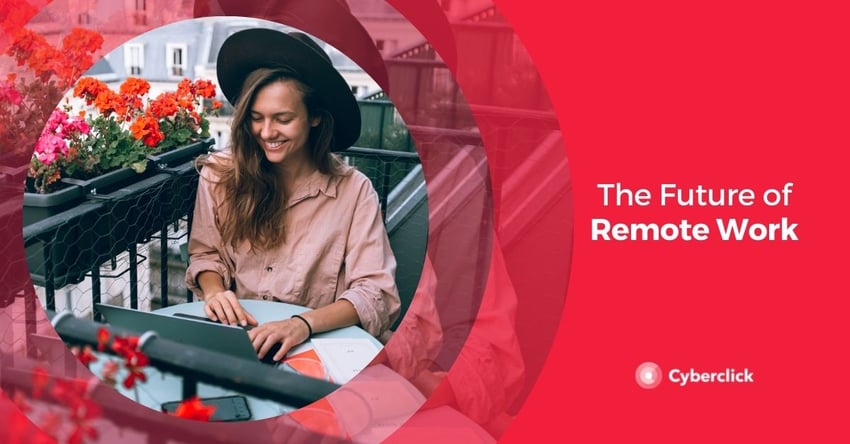The Covid-19 pandemic has had an impact on many aspects of our lives. One of the biggest changes has been to the way we work. Many companies around the world have had to adapt to remote work and offer a variety of flexible working solutions in order to keep their businesses and marketing strategies going. In fact, remote work has already become the norm in many industries.
Let's take a look at what this historic shift means for the business world, and what the future of remote work might look like. We will discuss some possible changes, and how these could benefit both businesses and employees around the globe.

What Does the Future of Remote Work Look Like?
So, what is the future of remote work? Will the concept of “remote work” continue to soar in popularity, or will everything eventually return to normal?
As lockdowns begin to ease and we start looking to the future, many companies are realising that there are a number of benefits to continuing to offer remote work or hybrid models that combine working from home with time spent in the office. In fact, Global Workplace Analytics predicts that by 2025, an estimated 70% of the workforce will be working remotely at least five days a month.
Obviously, this won’t apply to all industries. Certain jobs, such as those in travel and hospitality, cannot be done remotely. But when it comes to high-skilled workers whose jobs are done on computers, remote work in some form or another may well be here to stay. The future of remote work for these industries is likely to see many changes over the coming years. This will include changes to where we work, how we work, and the technologies that support us. We will also have to adapt how we measure performance and productivity, and how we interact with our colleagues.
What Things Will Change?
The future of work is likely to be very different compared to the pre-pandemic way of doing things. These changes are may include the way we use office spaces, the way we measure engagement and performance, and the way we connect and communicate with each other. Companies will also need to invest more in digital tools and platforms and adapt their policies and procedures accordingly.
Let’s take a look at some of these potential changes.
Office Space
As remote and hybrid working models become more popular, there will be less of a need for companies to rent large office spaces. Many companies will choose to go fully remote, completely eliminating the need for office space (resulting in cost savings for businesses).
Many others will choose to offer hybrid working solutions, where employees work from home for part of the week and only come into the office for collaborative activities like meetings, team-building exercises, and brainstorming sessions. In this case, instead of the traditional, compartmentalised office spaces, offices will need to adapt to a more communal, open plan design.
Companies will also need to invest more in digital technology to accommodate video conferencing requirements so that employees stay well-connected at all times, whether they are at the office or working from home.
Employee Engagement
The future of remote work is also likely to have an impact on employee engagement. Companies that hire remote employees will need to provide extra provisions to make sure employees stay connected and engaged at all times, regardless of physical location. Strategies that promote increased engagement among remote workers might include holding regular virtual events and online meetings to encourage employees to stay actively motivated and connected to one another.
How We Measure Performance
Up until now, a big factor in performance management was attendance and punctuality. As more and more people start working from home permanently, the methods and strategies we use to measure performance will need to adapt accordingly. Instead of focusing on traditional metrics like attendance and punctuality, more focus will need to be placed on actual output. In other words, the work an employee has done, rather than the hours they have spent at the office.
Performance management will also need to focus more on continuous monitoring, rather than annual performance reviews, and managers will need to provide regular feedback to maximise the performance of their team members. For this to work, managers will also need to promote trust and empowerment so that employees take responsibility for their own performance.
Ultimately, companies will need to adjust their goals and KPIs to the “new normal” to ensure maximum efficiency in all departments.
Increased Focus on Cybersecurity
The future of remote work, by its very nature, will require increased investment in cybersecurity infrastructures. Companies will need to assess how they manage and handle data, and what provisions they can make to ensure data protection at all times. This might involve rolling out remote encrypted servers or investing in tools and platforms that protect workers, data, and equipment.
In fact, according to a recent report by Cisco, 61% of surveyed organisations reported that they have experienced a jump of 25% or more in cyber-threats or alerts since COVID-19. This will prompt many organisations to make significant new investments in their IT systems and infrastructure.
Work-Life Balance
One of the biggest changes we are likely to see in terms of employees and remote work is the positive effect it will have on the work-life balance. The pandemic has caused many people to re-prioritise what’s important to them and to shift their focus to organising their work around areas including health, wellbeing, and childcare.
Working from home will give many people extra time to focus on these things, as the time spent commuting to and from the office each day will be drastically reduced. This time can instead be spent with family and on hobbies and relaxation activities, such as taking a walk before work and sharing more family meals together. All this can be expected to result in improved physical and mental health, and in more efficient and productive employees in the long term.
Equality and Diversity
Finally, the future of remote work is likely to have a positive impact on equality and diversity. This is primarily because remote work makes it easier for potential candidates with disabilities to access job opportunities and fit medical appointments around the working day.
An increased focus on remote work will also mean that employers can hire people from anywhere in the world, they are not limited to the local community. This opens up the talent pool and helps employers find the right person for the job, regardless of physical location, promoting a corporate culture based on diversity and inclusion.
CEO y cofundador de Cyberclick. Cuenta con más de 25 años de experiencia en el mundo online. Es ingeniero y cursó un programa de Entrepreneurship en MIT, Massachusetts Institute of Technology. En 2012 fue nombrado uno de los 20 emprendedores más influyentes en España, menores de 40 años, según la Global Entrepreneurship Week 2012 e IESE. Autor de "La empresa más feliz del mundo" y "Diario de un Millennial".
CEO and co-founder of Cyberclick. David Tomas has more than 25 years of experience in the online world. He is an engineer and completed an Entrepreneurship program at MIT, Massachusetts Institute of Technology. In 2012 he was named one of the 20 most influential entrepreneurs in Spain, under the age of 40, according to Global Entrepreneurship Week 2012 and IESE. Author of "The Happiest Company in the World" and "Diary of a Millennial".






Leave your comment and join the conversation